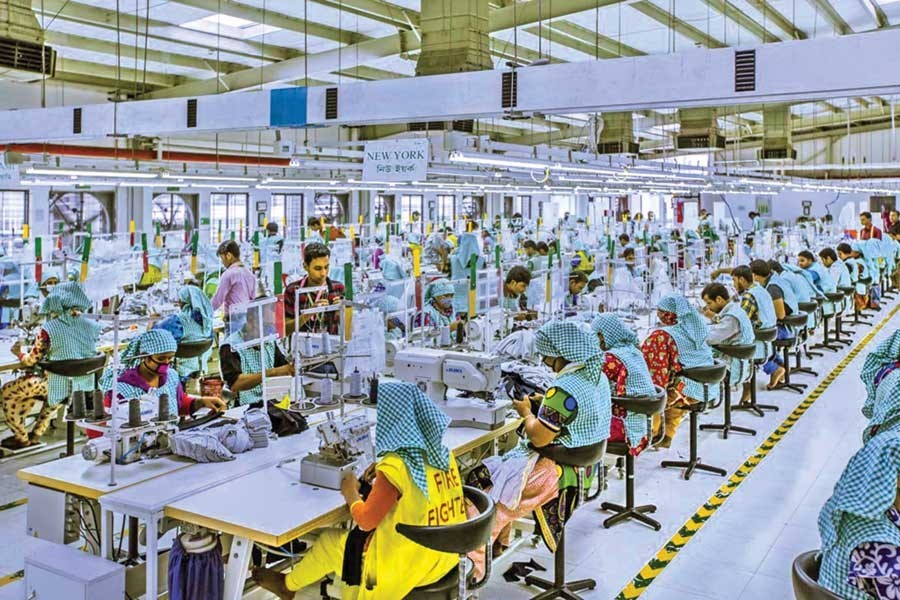US tariffs could deepen inequality in global RMG, warns AFWA
Calls for brand accountability as tariffs risk factory closures, layoffs

Published :
Updated :

The Asia Floor Wage Alliance (AFWA), a coalition of trade unions representing garment workers across Asia, has condemned the recent imposition of US tariffs on apparel imports, warning that the move could trigger a humanitarian crisis and exacerbate inequality in the global garment industry.
In a statement issued on Monday, the coalition also called for brand accountability, stating that companies profiting from outsourced production cannot remain silent when tariff changes lead to factory closures and mass layoffs.
"The US government's recent imposition of tariffs on apparel imports from Asia endangers the livelihoods of millions of garment workers, predominantly women, who are already earning poverty-level wages," the statement said.
Drawing parallels with the Covid-19 pandemic -- when global brands walked away from responsibilities, leading to widespread layoffs, unpaid wages, factory closures, and increased gender-based violence and harassment -- AFWA warned that history risks repeating itself unless action is taken to shield workers from the fallout of geopolitical tensions.
"Tariffs cannot be used as weapons in geopolitical conflicts. We reject this punitive tariff imposition that will have serious human consequences," said Wiranta Ginting, deputy international coordinator of AFWA.
AFWA outlined four core principles it believes should guide the restructuring of global trade in the garment sector to ensure justice and equity.
The coalition called for an immediate end to the weaponisation of tariffs. While tariffs may be legitimate fiscal tools, they are now being used as punitive geopolitical measures with no realistic prospect of reshoring garment production to the US, it said.
Due to high production costs, bringing apparel manufacturing back to the US would render clothing unaffordable for both domestic and global consumers, the group argued.
AFWA further stated that the current US tariff policy does not serve the interests of labour, but instead penalises Asian economies for geopolitical reasons. It rejected any tariff structure that distorts existing trade distribution in a way that favours certain countries over others within Asia.
"A disproportionate tariff structure risks destabilising the production base in Asia," the statement said, adding that tariff policies must not be used to divide the garment workforce or incite destructive competition among countries.
AFWA urged that tariff revenues be redirected toward social protection for workers, noting that garment workers in Asia earn some of the lowest wages in global manufacturing.
At least 50 per cent of tariff revenues collected by the US should be shared with producing countries through the creation of a "Social Security Fund" for garment workers, it proposed.
This fund would provide critical support to workers impacted by layoffs, factory closures, or production shifts caused by tariff-related disruptions. The alliance also called for this mechanism to be institutionalised in bilateral trade agreements.
As part of its fourth principle, AFWA stressed that global brands must be held directly accountable for the consequences of their sourcing decisions.
Citing the pandemic experience, the coalition criticised brands that abruptly cancelled orders and abandoned factories, leaving millions of workers -- mostly women -- without wages, severance, or support.
"No brand should be allowed to exit a factory without prior negotiation with the Asia Brand Bargaining Group (ABBG)," AFWA said, referring to its regional bargaining platform.
In cases of full factory closure, brands must ensure workers are fully compensated for their years of service, in line with national and international standards. For partial closures, laid-off workers should receive no less than 75 per cent of their wages during the layoff period, and full compensation if the layoff becomes permanent.
The coalition also called for a guarantee of rehiring for all terminated workers and stressed that labour must help shape the future of trade through a vision grounded in balanced industrial development and fair revenue distribution.
Rejecting what it described as an exploitative global trade model that enriches brands while plunging workers into poverty and debt, AFWA said, "The time has come to rewrite the rules of global trade -- one that places workers, not wealth generation for the few, at its core. The global apparel industry must be rooted in justice, equity, and accountability."
Brands must not be allowed to profit from low-wage labour and then disappear when crisis strikes, the alliance added, emphasising that governments should not weaponise trade at the expense of human lives.
"We call on the global labour movement to rise in solidarity with the Asian labour movement -- because when one part of the working class is attacked, the entire class is under threat," it said.
"Through binding brand obligations, redistribution of trade revenues to workers, and a united front against exploitative trade, we will fight back. Anything less is betrayal. Anything less is complicity," the statement concluded.
munni_fe@yahoo.com


 For all latest news, follow The Financial Express Google News channel.
For all latest news, follow The Financial Express Google News channel.